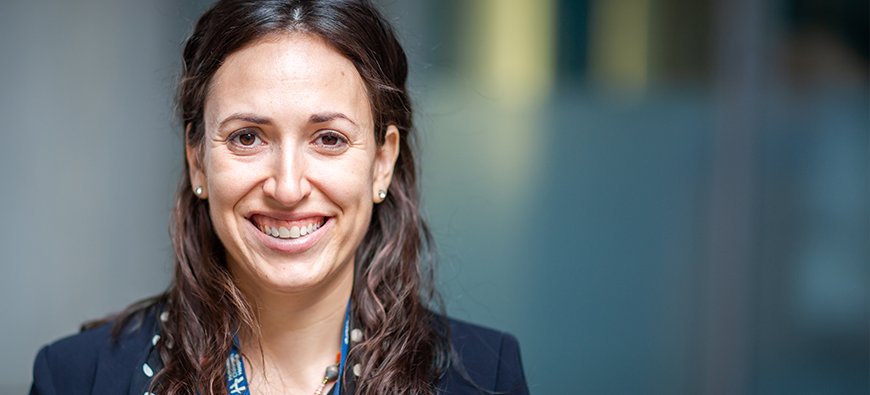
Introducing… a clinical and health psychologist
Dr. Kim Edwards is a clinical and health psychologist in the pediatric chronic pain program at Hamilton Health Sciences’ (HHS) McMaster Children’s Hospital.
Kim has been with HHS for over three years, helping to develop the organization’s first pediatric chronic pain program. The team has seen close to 400 new patients and families since the program started in 2015.
She also volunteers for the Big Brothers Big Sisters of Halton and Hamilton.
What does a clinical and health psychologist do?
I work on a wonderful team whose goal is to help children and adolescents with chronic pain. We also help caregivers learn effective strategies to better manage those patients with pain independently and improve their daily functions, such as going to school more regularly.
I identify and treat psychological factors that contribute to the maintenance and exacerbation of pain.
As a clinical and health psychologist, I am interested in the intersection of health and behaviour. More specifically, I identify and treat psychological factors that contribute to the maintenance and exacerbation of pain while also addressing emotional distress that can develop as a consequence of pain. This includes patients who may undergo bouts of depression.
When I work with young people, my first goal is to ensure my patients know I believe their pain is real. I then work with them to understand the effects of their pain on their lives and their treatment goals. Educating them about pain and discussing the impact of lifestyle factors on pain are also important components.
I can help young people accept their current situation, teach some relaxation strategies and empower them to advocate for their needs.
What are you most proud of since you started working at HHS?
One of my proudest initiatives was helping to develop a successful five-week evidence-based caregiver group that we have run, concurrent with a youth group, over 10 times since the clinic began. We are currently evaluating the group through a research project and hope to share the program with other pediatric chronic pain clinics across Canada.
What keeps you motivated at work?
In addition to the patients we serve and the joy experienced from helping them achieve their goals, I enjoy working on a dynamic, supportive, passionate and creative team comprised of leaders in the field of pediatric chronic pain. We have no shortage of team potlucks, birthday celebrations, humorous hallway conversations and daily laughter.
I love giving young people with chronic pain and their families hope that they can get their lives back.
What do you love most about your job?
One of my first families remarked after their initial assessment that their daughter couldn’t wait to go out for ice cream. The mother asked her why and the daughter said, “Because we finally found doctors who believe that my pain is real and who can help me get better.”
This story sums up what I love most about my job: giving young people with chronic pain and their families hope that they can get their lives back. It’s about supporting them in their journey and observing examples of their strength and resilience every day.
Who inspires you?
My mother inspires me. She became deaf at four years old and learned to lip-read so she could remain immersed in her hearing community.
She once used her lip-reading abilities to assist the police and patients with a tracheotomy. My mom also showed me the meaning of being an advocate and inspired my career choice to help youth overcome their challenges to lead fulfilling and meaningful lives.
